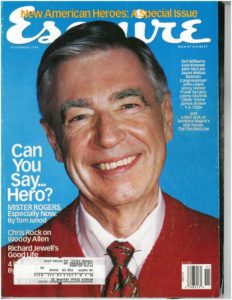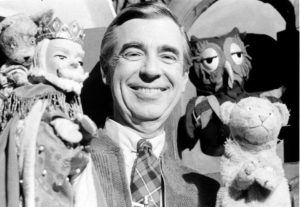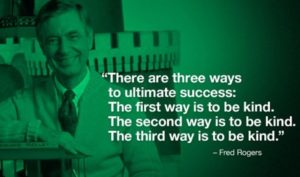An Ironic Apotheosis

This year we have heard and read much about Fred Rogers, his life and work. For a lifelong Republican and ordained Presbyterian minister the words “subversive” have been applied to Rogers, but so do the words “kindness” and “goodness”. Currently, many wish to consider Rogers’ values that may be in decline. In this essay that explores Rogers in an astrological context, I will add the adjectives “effective” and “significant” to describe him, for Rogers was also successful and culturally impactful in his day and in ours. Adding Fred Rogers to my series on Exemplary Individuals was, in common parlance, a no-brainer.
Earlier this year the documentary Won’t You Be My Neighbor came out to critical acclaim and surprising popularity at the box office. This year also marked the fiftieth anniversary of the first mass-marketing airing of Mister Rogers’ Neighborhood and the fifty-first since its first airing ever, celebrated by a Google Doodle at that time. This cartoon serves as a good introduction to him. Next year will be a “biopic” of Rogers — I bet you can’t guess who has the lead role (answer below).
Year Two Episode Six: Competition and Being Special
If, like me, you were too old – in age or emotional condition – to watch a show aimed at preschool children when it originally aired, it might be time well-spent for you.
Here’s a sample. This show has the same opening illustrated in the Google Doodle above. Rogers appears, carrying three sticks that he makes into a stand that becomes a chair that he places in front of an easel, upon which he draws some patches with crayons. Rogers draws a child-like depiction of a house and tree and sky, stating that if feels good to do things, that it’s the doing that what’s fun, not what others think of it. Next we see a video presentation of how crayons are made and packaged with Rogers doing the voice-over.
One notes the quiet atmosphere, simple backdrop, and calming piano music that appears and imperceptably goes away. Rogers’ programming made a deliberate contrast to the noisy and overstimulating television that passes for children’s entertainment.
We now enter the puppet-land “Neighborhood of Make Believe” and encounter King Friday XIII who announces a contest to draw the neighborhood, with an undetermined prize and the King as the judge. As puppet-children were processing this, one says, “sometimes grown-ups have fun ideas, sometimes they don’t.”
Toward the end of the episode we return to Mister Rogers who draws his own child-like picture of the neighborhood. He asks, “What would you put in your drawing? The best thing is that each person’s would be different”, then he launches into song, “You are my friend, you are special to me, you are the only one like you…” He concludes, “you are the only one exactly like you so you have already won in this world, because you’re the only one who can be you. The things you do are always a little bit different from anybody else, and that’s the way it’s supposed to be.”
Then, to the accompaniment of soothing piano music, he suggests that you draw whatever you like, show it to people you love, and ask them if they like to draw too. “Sometimes other people will surprise you with things you never knew they could do.” And with an upbeat closing tune, he changes back into his street clothes and leaves. End of episode.
His television shows usually addressed a child’s concern and contained some kind of lesson – about getting along with others but also getting along with oneself and one’s own range of emotions, or how to understand confusing events like parental divorce, or understanding events in the larger world that were upsetting grown-ups in their lives. He addressed racial incidents at integrating swimming pools by taking a foot bath with one of his characters, the black neighborhood policeman, and in one episode defined “assassination” for his very young audience.
Fred Rogers Around Town

Many of this year’s laudatory articles on Rogers cite Tom Junod’s profile “Can You Say…Hero?” in Esquire that was published the previous year, depicting a seventy-year old Fred Rogers taking the correspondent around his world and opening up about his life. There are memorable scenes depicted in this article, including Rogers visiting a teenager with cerebral palsy and asking the teenager to pray for him. On another occasion he arrives at Penn Station in New York to record a television segment and somebody yells “It’s Mister fucking Rogers!” and a crowd of children and adults gathers around him. There’s the time he was on a bus with many children: none of these mostly black and Hispanic children approached him, they just began singing songs together from his shows. He was constantly approached by people thanking him for his contribution to their lives.
Rogers didn’t smoke or drink, was a pacifist and was vegetarian – “I don’t want to eat anything that has a mother.” Evidently his favorite movie was Forrest Gump that he watched about a hundred times. (In case you’re wondering who’s cast to play Rogers in the film coming out sometime next year, it’s Tom Hanks — of course.)
His Career Seems like a Straight Line
Fred Rogers was from wealthy parents and grew up in a comfortable home in Latrobe, Pennsylvania. He recalled a lonely childhood, playing with puppets to amuse himself. He first learned music from his maternal grandfather with whom he was close. He went to Dartmouth College in New Hampshire but graduated from Rollins College in Florida with a degree in music composition, where he met his future wife.
Rogers became intrigued but also angered at the new medium of television – he saw television as a powerful vehicle but also intensely disliked the violence in children’s programming and its tendency toward pointlessly over-stimulating them in the service of “entertainment”. He began working entry-level at NBC. In a few years he returned to the Pittsburgh area and a job at WQED, an early community-funded television station, forerunner of what we now call public television. This would be his first big break.

He collaborated with Josie Carey in The Children’s Corner from 1954 to 1961. He developed the music she the lyrics; she was in front and he was in back playing the puppets. A pioneer in children’s television in her own right, Carey died this past summer. This show won them both an award for children’s television programming. During this this time Rogers was also ordained as a protestant minister, and it was clear his “ministry” would be a unique one.
When the Children’s Corner ended, Rogers and his family moved to Toronto where he produced Misterogers for the CBC, developing further his sets and routines. After a few years he obtained the rights to this program, returned to Pittsburgh and WQED and Mister Rogers’ Neighborhood premiered there in September 1967. Some stations that carried his program were in New York, Washington DC, and Boston, and the quality of the work did not escape notice. On February 19, 1968, the first nationally-televised program was aired. There would be 894 more over the next few decades.
What made Mr. Fred Rogers unique was not the many positive qualities of his character – many others also have them – but that he would become so successful, acclaimed and frequently awarded, for these same qualities. His astrological chart shows his kindness and compassion but discipline, ambition, and zeal. Let’s begin with the “kindness and compassion” part.
All that Pisces
Most obvious is Sun and Moon in Pisces and a close conjunction of Mercury and Venus, also in Pisces, all in the Eleventh House or Place. Additionally, his Ascendant and First House in Taurus makes Venus, exalted in Pisces, the ruler of his place of “Life”, of his personal style and temperament.
Although there are some mean people with significant planetary artillery in Pisces, in Rogers we find many of this sign’s positive attributes, beginning with a quiet friendly demeanor that’s also caring and sensitive. Pisces is a watery mutable sign and can display depth of feeling and a spiritual sense of the world. Some astrologers also note that the Moon, eighteen degrees ahead of the Sun in the zodiac, if at its last sunrise visibility and would be “balsamic” – a Pisces-like phase.
We now consider the number 143: each day after his morning swim, Rogers weighed himself the same way and the number 143 would come out (considering a height of about six feet, this put him on the lanky side). We can begin with the sign Taurus, the sign of his Ascendant, that is oriented to body and its physicality but when we arrive at its ruler Venus it’s in the phlegmatic sign Pisces. Saturn is in Sagittarius helps us understand this more.
Saturn, fully in sect in Rogers’ diurnal chart, is in a the tenth house position from his planets in Pisces. Saturn is also the next visible planet that the Moon aspects. Mutable Pisces can lack focus and consistency. Saturn can gently mold its character into disciplined manifestation.
Venus and Mercury, the Affable and the Intuitive
We now approach an odd combination: Venus, ruler of the Ascendant is in exaltation and conjunct Mercury that is in fall in Pisces. Venus, a planet that deals with feeling and sentiment, is an “honored guest” in this sign; linear Mercury can be uncomfortable in watery amorphous Pisces. This combination favors Venus and gives a Venus coloring to Mercury. Yet Mercury has some fine features: it is oriental, rising before the Sun which is a positive indicator in a day birth (Venus, a nocturnal planet, has to take a back seat here). Mercury is also in sect in his diurnal chart.
Venus comes out in Rogers’ musical ability – he wrote more than two hundred songs – and his affable interpersonal style. Although he had the same range of emotions as we all do, and spoke eloquently to children about all kinds of negative states of mind that continue to afflict us. There exuded from him an emotional sensitivity that brought out the healing qualities of those who shared space with him.

Rogers’ Mercury, assisted by his strong Venus placement, brought out his gift of articulation, not in the mercurial way of being clever but as emotionally direct and often quite simple. A favorite quote of his was that “deep and simple is far more essential than shallow and complex” – this is Mercury in Pisces at its best. A quick web search comes up with many examples of Rogers’ understated eloquence.
Both Venus and Mercury in Pisces display an ability to listen, an art rather lost in today’s culture that communicates by posturing. Although Rogers frequently consulted with child development specialists, it’s clear that his language and understanding of children come from (1) having been one once, and (2) listening to them and identifying with them.
From ancient astrology we see another indication of the importance of his Venus-Mercury conjunction. Noting Fred Rogers’ Lot of Fortune at twenty-seven degrees of Aries (we’ll discuss this position soon), and taking the distance between this Lot and the Ascendant, it’s just under eighteen degrees. We go eighteen degrees the other way from the Ascendant and we find ourselves at three degrees of Gemini, and that becomes the position of his Lot of Spirit or Daemon. This is almost exactly ninety degrees from the Venus-Mercury conjunction so that these planets are angular to the Lot of Spirit or Daemon. This further indicates an independent and forward-thinking mind.
Fred Rogers: Man on a Mission

We know that Rogers was a sensitive and articulate individual but that’s only a fraction of him. We need to consider the man who chose television as a career because he was angry. Remember that Rogers’ first exposure to television didn’t leave him comforted and he approached children’s television with the energy of a reformer.
Note Mars in the Tenth House or Place of career, out of sect but oriental to the Sun – a very active and visible Mars. Placed in Aquarius, Mars has a strong relationship to Saturn, its sign ruler that also Is in sextile to Mars. This sextile between the tenth-house inhabitant and its sign ruler Saturn helps tame Mars and gives it focus. Importantly, Mars is also the ruler of the worldly Lot of Fortune in Aries and is in the Eleventh Place from Fortuna, an important consideration for depicting prosperity and worldly success — under the guidance of the red planet.
We need look at Jupiter in the Twelfth from the Ascendant that is in the same sign as the Lot of Fortune, also an important planet for Rogers’ worldly success and fortune. Jupiter in Aries is governed by Mars in the Tenth and is also in sextile to Mars. Mars in the Tenth, at a midpoint between Jupiter and Saturn, receives benefit from both. Along with Mars, Jupiter is a strong significator of his career and reputation. Being in the Twelfth House does not seem like a major factor here,
Jupiter is the domicile ruler of all his planet in Pisces (not Neptune!). Binding Rogers even closer to Jupiter, the large planet is in mutual reception with the Sun – Jupiter is in the Sun’s sign exaltation, Sun in Jupiter’s domicile sign – this helps us link his personal characteristics with his worldly success. We have plenty of public examples of successful people whose character is shallow and self-absorbed; we also find in our personal lives some extraordinary people who have little or no worldly success. Fred Rogers’ chart shows the possibility of both. These planets helped create the transformative individual that he was.
Rogers Goes National Step by Step
Collaborating on The Children’s Corner with Josie Carey was the break that brought him closer to his vocation and to the attention of others involved in children’s television. There was much astrology in his life at the time. Note his progressed chart for August 20, 1955, the date of the first release of this series. You can see how in his twenty-eighth year the Pisces planets had moved into Aries; the progressing Moon had gone through most of the zodiac by this time.
Progressed Sun trine Neptune was exact only shortly before this date, and during this time Jupiter was completing a trine to Saturn. This was a perfect time for Rogers to begin a personal connection to mass media and popular culture at large.
Less happily, progressed Ascendant (by solar arc, the same rate as the progressing Sun) was completing an opposition to Saturn. During this time transiting Saturn was in Scorpio, opposing his natal Ascendant – I strongly suspect this was not a happy time in his marriage. (Their two boys were born a few years afterward.)
More pertinent to his career are many planets that transited his Midheaven degree at 25 Capricorn during this time: Neptune at 25 Libra was exactly square and the previous year – while in preparation – Jupiter and Uranus were together opposing his Midheaven degree. This was Rogers’ opportunity to use his own personal background and vision to produce something truly creative. His decennials changed from Saturn-Venus to Saturn-Moon in May 1955, also bringing out his personal background and style but in a disciplined and focused way.
Fast-forward to February 19, 1968, the first showing of Mister Rogers’ Neighborhood, his full emergence onto a national stage. Jupiter displays itself prominently and there’s a surprising decennial.
His secondary progressions show that two weeks after Mister Rogers’ Neighborhood’s first national broadcast, progressed Venus perfected its conjunction with progressed Jupiter. Looking at his transits for this time, we see Jupiter going into Virgo, thus forming oppositions to natal Venus-Mercury (exact that month) and also in aspects to Moon, Saturn, and Sun as the year turned into autumn. Jupiter is, as mentioned often before, the planet about including oneself in a wider world. In his case it was as a nationally recognized individual.
On the same auspicious day of February 19, 1968, Rogers’ decennials changed from crusading Mars-Jupiter to Mars-Saturn! Most ancient astrological “cookbooks” consider this combination of malefics to portend misery. We must remember, however, that these two planets are in sextile to each other in Rogers’ chart, Mars of the larger cycle inhabiting the Tenth Place, Saturn governing the Tenth. This combination will continue until mid-1970 and includes Rogers’ famous appearance to the US Congress on May 1, 1969.
Rogers’ network was facing severe budget cuts from the contributions of the federal government and the network brought out Rogers to make a defense. You can see the short video for yourself. His appearance before the Senate (chaired by Rhode Island’s own John Pastore) worked spectacularly and was another step taking him — and public television itself — into national visibility.
Earlier in the year, Jupiter had moved from Virgo to Aries and, with transiting Uranus, were opposed to natal Uranus. This time portrayed Rogers entering midlife with a strong contribution from Jupiter. During the spring of that year both Jupiter and Uranus had gone retrograde back into Virgo – to transit Rogers’s Sun in Pisces, repeating the transits of the autumn of the previous year. Transiting Jupiter and Uranus on Rogers’ Sun and Uranus correspond not only to the beginning of midlife but a miraculous year for him and his vocation.
Final Words – From Others
Since Rogers has received so much commentary this past year it’s fitting to end with some of it.
Here’s from David Brooks, a relatively conservative columnist writing for the New York Times, shortly after the release of Will You Be My Neighbor. “Rogers was singing from a song sheet now lost, a song sheet that once joined conservative evangelicals and secular progressives. The song sheet may be stacked somewhere in a drawer in the national attic, ready for reuse once again.”
A more personal testament from Todd VanDerWerff, recently writing on Vox.
“I have struggled, throughout my life, with belief, but the times when I’ve seen the best evidence for something divine hasn’t involved sunsets or other miraculous natural displays. No, they’ve been moments where humans are kind to other humans, even when they don’t need to be, when people go out of their way to help, even when there’s no reason. Is that because I watched a lot of Mister Rogers’ Neighborhood growing up? I don’t know — but I like to think it might be.”
We return to Tom Junod’s profile “Can You Say…Hero?” that depicts Rogers during his final years. He goes beyond the focus on children’s television programming onto our contemporary shared culture.

“The revolution he started—a half hour a day, five days a week—it wasn’t enough, it didn’t spread, and so, forced to fight his battles alone, Mister Rogers is losing, as we all are losing. He is losing to it, to our twenty-four-hour-a-day pie fight, to the dizzying cut and the disorienting edit, to the message of fragmentation, to the flicker and pulse and shudder and strobe, to the constant, heavy drone of the electroculture…and yet still he fights, deathly afraid that the medium he chose is consuming the very things he tried to protect: childhood and silence.”
Words for us all today.




